

Trauma — Jethro Jones. Childhood trauma in our schools.
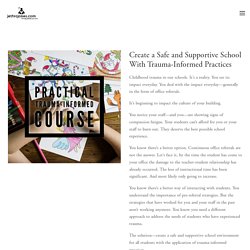
It’s a reality. You see its impact everyday. You deal with the impact everyday—generally in the form of office referrals. It’s beginning to impact the culture of your building. You notice your staff—and you—are showing signs of compassion fatigue. You know there’s a better option. You know there’s a better way of interacting with students.
Conversations about Historical Trauma: Part One. How stress affects your brain - Madhumita Murgia. Nadine Burke Harris on the Impact of Childhood Adversity. CHRISTIANE AMANPOUR: Pioneering research on a different level is now finding that adversity or trauma experienced in childhood cannot only show up in the mental health of adults but it could also be harmful to physical health.

Our next guest has devoted her career to that research. Dr. Nadine Burke Harris is a pediatrician. She’s the first and current surgeon general of California. And she has a new book out called “The Deepest Well: Healing The Long-Term Effects of Childhood Adversity”. MICHEL MARTIN, CORRESPONDENT: Dr. NADINE BURKE HARRIS, AUTHOR, THE DEEPEST WELL, HEALING THE LONG-TERM EFFECTS OF CHILDHOOD ADVERSITY: Thank you for having me. MARTIN: So I’m going to start with your job. HARRIS: A lot of my focus is on adverse childhood experiences and the impacts that early adversity have on later life health. MARTIN: What makes you say that? HARRIS: So the definition of a public health crisis is something that affects a lot of people and the effects are bad.
10 Tips for Teachers with Students Who Have Experienced Trauma. With grief, sadness is obvious. With trauma, the symptoms can go largely unrecognized because it shows up looking like other problems: frustration; acting out; difficulty concentrating, following directions, or working in a group. Often students are misdiagnosed with anxiety, behavior disorders, or attention disorders rather than understood to have trauma that’s driving those symptoms and reactions.
For children who have experienced trauma, learning can be a big struggle. But once trauma is identified as the root of the behavior, we can adapt our approach to help kids cope when they’re at school. Starr Commonwealth Chief Clinical Officer Dr. 1. If a child is having trouble with transitions or turning in a folder at the beginning of the day, remember that children may be distracted because of a situation at home that is causing them to worry. 2. A daily routine in the classroom can be calming, so try to provide structure and predictability whenever possible. TheHeartofLearningandTeaching. Combating childhood trauma: One elementary school's radical approach to mental health. A Glimpse Inside the Transition to Trauma-Informed Practices. Getting Started With Trauma-Informed Practices. Trauma Training Toolkit 8 29 2016. The How and Why of Trauma-Informed Teaching. Working with trauma-affected students is a difficult balancing act.
We acknowledge the harmful impacts of the past, and hold out hope for a future of healing. We create a safe environment for students to share their lives, yet maintain professional boundaries. We provide our caring and our help to others, but have to pay attention to our own well-being, too. We work in our classrooms but depend on the support of our community. These were the clear takeaways for teachers who participated in Edutopia’s recent Twitter chat on the topic of trauma and social and emotional learning (SEL). Trauma-Informed Schools 101: Simplified. 1549989839.pdf. The Marshall Memo Admin - Issues. 1.
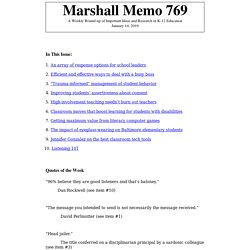
ACES (Adverse Childhood Experiences): What is it? How to Build a Trauma-Sensitive Classroom Where All Learners Feel Safe. Making The Shift To A Trauma-Informed School: Part I - Classroom Chronicles. Recently, the office of student support at the Tennessee Department of Education announced the first cohort of schools selected to participate in the state’s model trauma-informed schools initiative.
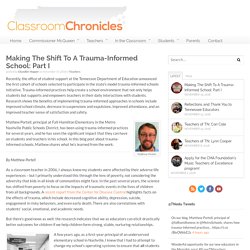
The Heart-Brain Connection: The Neuroscience of Social, Emotional, and Academic Learning. Teaching Self-Regulation in the Early Grades. For children who have adverse childhood experiences (ACEs), co-regulation is at the heart of teaching—and of discipline.
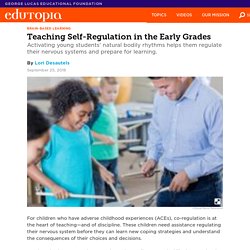
These children need assistance regulating their nervous system before they can learn new coping strategies and understand the consequences of their choices and decisions. We don’t hesitate to teach our students the reading or math skills they need to be successful, and emotional and behavioral skills should be no different. Students with ACEs may come to school having little experience with impulse control and emotional regulation. They may struggle with paying attention. These are executive function skill sets our students need to be academically, socially, and emotionally successful. The strategies described here are Tier One strategies in a Response to Intervention model for discipline and engagement. Strategies for Helping Young Students Regulate Their Responses 1. Trauma-Sensitive Schools Training Package. Schools play a significant role in supporting the health and well-being of children and youth, including those affected by traumatic experiences.
NPR Choice page. Adverse Childhood Experiences. Use one of the services below to sign in to PBS: You've just tried to add this video to your Watchlist so you can watch it later.
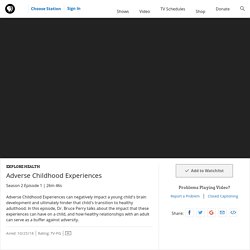
But first, we need you to sign in to PBS using one of the services below. You’ll be able to manage videos in your Watchlist, keep track of your favorite shows, watch PBS in high definition, and much more! You've just tried to select this program as one of your favorites. Why Core Life Skills Development Is So Important. Every day we take on the ordinary, sometimes challenging, tasks of work, school, parenting, relationships, and just managing our busy lives.
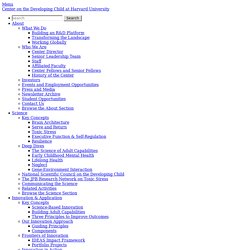
How do we navigate these tasks successfully? And what can send us off course? Science offers an explanation. This 5-minute video explores the development and use of core capabilities — known as executive function and self-regulation skills — from early childhood into adolescence and adulthood. Building on the Center’s 2013 video presenting the theory that building adult capabilities is necessary to improve child outcomes, this new video describes what these skills are, why they are important, how they develop, and how they are affected by stress.